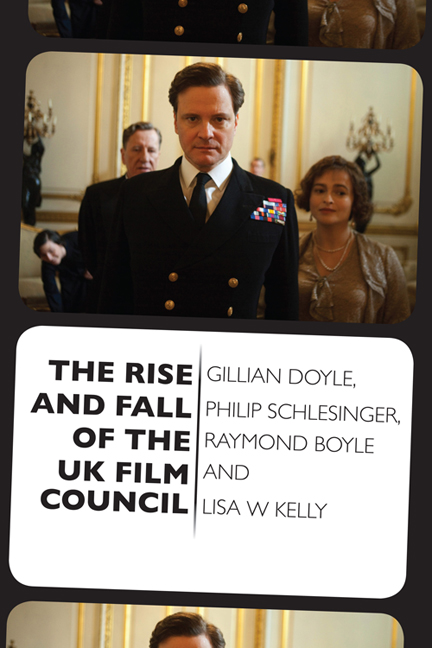Preface
Published online by Cambridge University Press: 05 September 2016
Summary
This book is based on findings from a research project entitled The UK Film Council (UKFC): A Case Study of Film Policy in Transition, which was led by Professor Gillian Doyle (principal investigator) and conducted by her and a team comprising co-investigators Professor Philip Schlesinger, Professor Raymond Boyle and Research Associate Dr Lisa Kelly, all based at the Centre for Cultural Policy Research (CCPR) at the University of Glasgow. We gratefully acknowledge the support of the Arts & Humanities Research Council (AHRC) (Reference AH/J00457X/1). The broad objectives of our study, which ran from September 2012 until March 2015, were to investigate the history of the UK Film Council (UKFC), to examine its effectiveness as a model of public support for film and also to analyse what lessons can be drawn from its experience.
Established in April 2000 but wound up at the end of March 2011, the UKFC was the key strategic body responsible for supporting the film industry and film culture in Britain for more than a decade. Our project investigated the UKFC's short-lived experience as lead support body for film and the fundamental questions raised, in the wake of the Council's demise, about how strategic interventions for film in the twenty-first century may be framed and put into operation.
It is important to understand the scope and limitations of the present work. The Film Council became the head of a so-called ‘family’ of partner organisations – see Appendix 1. There is a separate tale to be told about this extensive network and how it operated. The present study, however, confines itself to what we have judged to be central aspects of the UKFC's operations. There is no shortage of further work to be done.
Our investigation involved extensive fieldwork, including some fifty interviews with key policy-makers, former UKFC personnel, industry analysts, leading film-makers and other prominent film industry stakeholders. Our interviews (that, with only three exceptions, were conducted by telephone or Skype) were generally all audio-recorded face to face. All were professionally transcribed with full confidentiality observed where requested.
- Type
- Chapter
- Information
- The Rise and Fall of the UK Film Council , pp. viii - xPublisher: Edinburgh University PressPrint publication year: 2015

